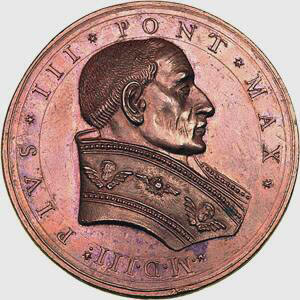 Though Alexander was dead, Caesar still lived and lived in Rome where he
could keep an eye on the conclave. But it was a sick Caesar, a Caesar still
shaky from his bout with fever that all eyes watched anxiously. Even so,
the cardinals were frightened enough to plan to hold the conclave in the
Castle of St. Angelo rather than the Vatican. But when the ambassadors of
the Empire, France, Spain, and Venice joined the cardinals in urging the
terrible duke to withdraw, the convalescent Caesar agreed to do so. With
his litter disappeared his chance to dominate the conclave. The Borgias
were on the way out.
Though Alexander was dead, Caesar still lived and lived in Rome where he
could keep an eye on the conclave. But it was a sick Caesar, a Caesar still
shaky from his bout with fever that all eyes watched anxiously. Even so,
the cardinals were frightened enough to plan to hold the conclave in the
Castle of St. Angelo rather than the Vatican. But when the ambassadors of
the Empire, France, Spain, and Venice joined the cardinals in urging the
terrible duke to withdraw, the convalescent Caesar agreed to do so. With
his litter disappeared his chance to dominate the conclave. The Borgias
were on the way out.
Three candidates led the field in this conclave--the great enemy of
Alexander VI, Giuliano della Rovere, the wealthy and powerful minister of
Louis XII, Georges d'Amboise, and the raffish Ascanio Sforza. When none of
these could gain the necessary majority, they turned to a compromise
candidate, Francesco Piccolomini, a sick old man. On September 22,
Francesco was elected and took the name Pius III. It was a popular choice.
Francesco Todeschini Piccolomini was born May 9, 1439, in Siena. His father
was a man of great wealth. His mother, Laodinica Piccolomini, was the
sister of Pope Pius II. Pius adopted young Francesco and gave him his name
and coat of arms. He proved to be a bright student, and took his doctorate
in law at the University of Perugia. Although Pius II made him a cardinal
and archbishop of Siena at the age of twenty, he did not take priest's
orders until elected pope as an old man of sixty-four. Pius II, however,
took good care to give him a holy and able coadjutor to act as bishop in
his place.
Young as he was, Francesco proved worthy of the sacred college by his
excellent life. During the worldly times of Sixtus IV and Alexander VI,
Cardinal Piccolomini stayed away from Rome as much as he could. He served
the Popes as legate on various occasions, with skill and usually with
success. The election of such a man, as able as he was religious, delighted
those who yearned for a thorough reform. But Pius was not to be given the
opportunity for accomplishing great things.
Although only sixty-four when elected, Pius was a sick man. Tormented by
gout, he suffered severely, but bravely went through the ceremonies of
ordination, consecration as a bishop, and coronation as pope. So sick that
he had to say Mass sitting down, the courageous Pope tried desperately to
carry on the business of the papacy. He planned to call a general council.
He announced that he was to be a pope of peace. But the pressure was too
much for his tired old frame. He fell into a fever and by October 17 his
doctors were in despair. After receiving the viaticum and extreme unction,
the noble old man died peacefully on the evening of October 18. He had been
pope for less than a month.
Excerpted from "Popes
Through the Ages" by Joseph Brusher, S.J.

